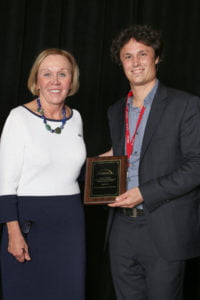
Thomas Funck-Brentano, member of the ECTS Academy, received the ASBMR 2017 Fund and Research New Investigator award for his work on the effects of Porcupine on bone mass and strength.
Thomas says: I’m so grateful to the ASBMR for this award that emphasizes the benefits of a wonderful mobility experience as a postdoctoral fellow. Our work on Porcupine and its effects on bone was highlighted at the last ASBMR 2017 annual meeting. Porcupine is the protein that adds palmitoleate on WNTs in the endoplasmic reticulum, thereby enabling their cell trafficking, their secretion, and their binding to the Frizzled receptors. Porcupine inhibitors are currently in Phase I clinical trial for cancers, but their effects on bone are still unknown. These compounds block all WNT signaling. Our study in adult female mice shows that these targeted therapies dramatically reduce both cortical and trabecular bone mass and strength, by decreasing bone formation and increasing bone resorption. Thus, we speculate that these therapies would increase fracture risk, especially in cancer patients already at high risk.
This work was done in Pr. Claes Ohlsson’s Center for Bone and Arthritis Research, in the University of Gothenburg, Sweden. This laboratory represents a rather unique opportunity to perform high quality translational research on bone health issues in Europe and in the world. Indeed, the spectrum of research goes from the best in vitro and in vivo models, to amazing epidemiological and genetic research studies using both Swedish and international databases. As being an assistant professor of Rheumatology in Lariboisière Hospital, University Paris Diderot and PhD in Pr. Martine Cohen-Solal’s BIOSCAR INSERM UMR1132 lab working on the role of the subchondral bone in osteoarthritis, I can’t think of a better place to do my post-doc, and enrich my skills in translational research. Apparently, the EU also considered this to be a “perfect match” (as they like to express) since Claes and I were granted by the H2020 Marie Sklodowska-Curie Individual Fellowship. With this proximity, there is no doubt our collaboration will go on way beyond the two-year post-doc program. Europe is definitely a great source of high quality research network. And the ECTS and its Academy are its bioreactor!
